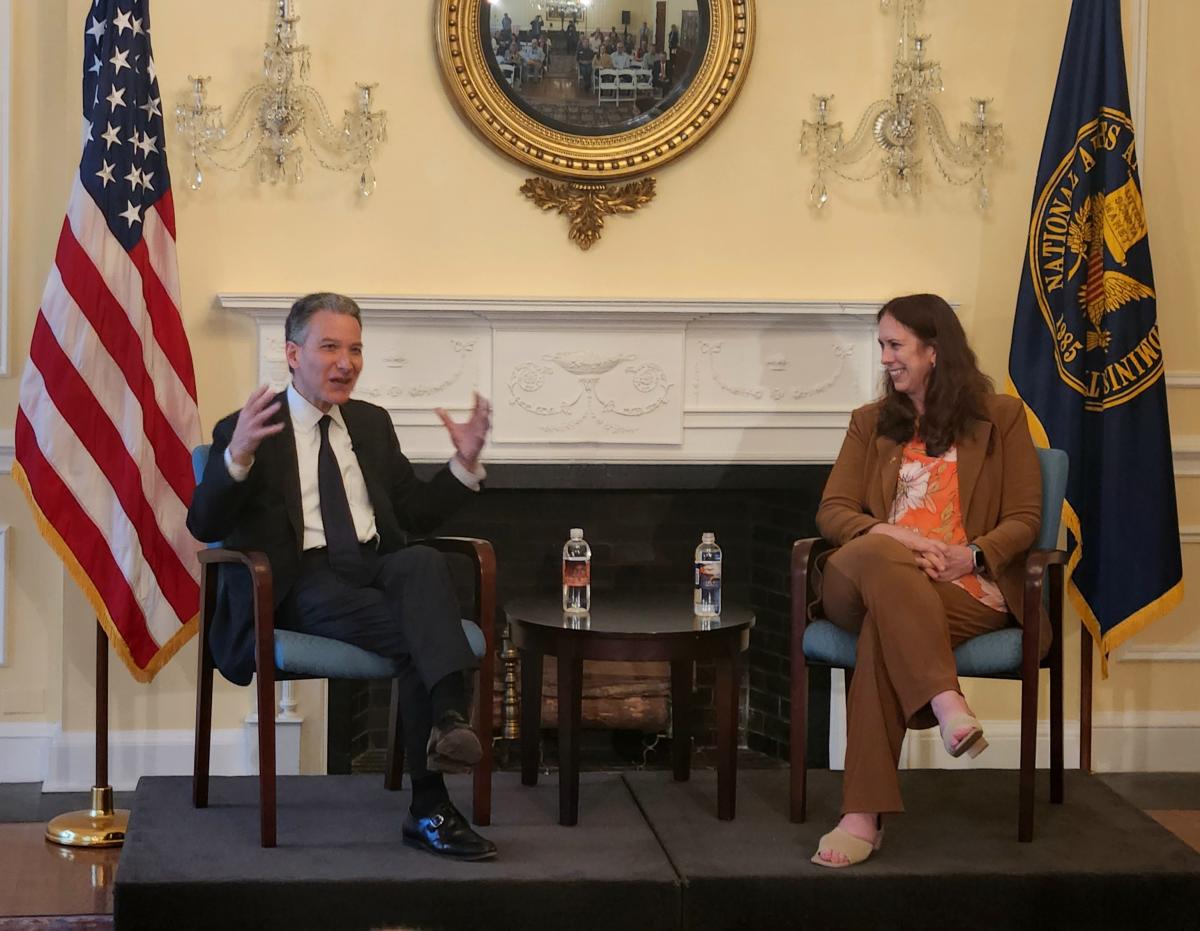The following is a press release issued by the (U.S.) National Archives and Records Administration:
Classical Greek and Roman thinkers exerted a profound influence on America’s Founders, according to Jeffrey Rosen, author of “The Pursuit of Happiness: How Classical Writers on Virtue Inspired the Lives of the Founders and Defined America.”

Enlarge
President of the National Constitution Center and author Jeffrey Rosen and Archivist of the United States Dr. Colleen Shogan discuss the Founders’ “Pursuit of Happiness” at the National Archives in Washington, DC, April 24, 2024, to kick off a multiyear celebration of the 250th anniversary of the founding of the United States of America. National Archives photo by John Valceanu.
On April 24, to kick off the National Archives' multiyear celebration of the 250th anniversary of the United States of America, Archivist of the United States Dr. Colleen Shogan hosted a conversation with Rosen. The two discussed what “the pursuit of happiness” meant to the nation’s Founders and how that famous phrase defined their lives and became the bedrock of our democracy.
According to Rosen, who serves as president of the National Constitution Center, the Founders idea of “the pursuit of happiness” may, surprisingly, stand in stark contrast to what the phrase means to Americans today. “When you think about happiness today, it’s ‘You do you! Let it all hang out! Follow your bliss!’ Pursuing pleasure, basically,” Rosen said. “For the Founders, it was the opposite. It was resisting immediate pleasure so you could achieve the long term well-being that comes from self-mastery.”
Shogan asked if the regulation and self-moderation of immediate gratification that the Founders found so critical in building the nation were in opposition to another of the three founding principles: liberty.
“For the Founders, personal self-governance is necessary for political self-governance,” Rosen stated. “Far from being in tension, they think the whole American experiment is going to fall, unless people can find the self-restraint, the moderation, the self-mastery to do two things: First, to learn enough about the history of liberty, so that they’ll defend it when it’s under siege. And second, to vote wisely; to choose moderate, temperate, virtuous leaders who, instead of being driven by ambition or avarice, will tend to the public good.”
During the discussion, Shogan noted the stark dichotomy that the Founders included life, liberty, and the pursuit of happiness in the Declaration of Independence as “unalienable rights,” while many themselves relied on and profited from the labor of enslaved peoples.
“It was very striking that all of the enslavers from Virginia in the founding generation—Jefferson, Mason, Madison, Patrick Henry, and Washington—all said that slavery was immoral and violated the natural rights of the Declaration. And when Jefferson said ‘All men are created equal,’ he included enslaved people in that, and he always insisted that slavery should end at some point in the distant future. What was really striking for me to learn is that, far from denying their hypocrisy, they acknowledged it.”
Following the discussion, the speakers received questions from the audience.
View the discussion on the National Archives YouTube Channel.
View the National Archives Calendar of Events for information on future events.
 Latest News Articles
Latest News Articles If you do not see a Plus Sign that is labeled "Add comment," you will need to upgrade to either a (FREE) Standard Edition or a (paid) Plus Edition subscription
If you do not see a Plus Sign that is labeled "Add comment," you will need to upgrade to either a (FREE) Standard Edition or a (paid) Plus Edition subscription